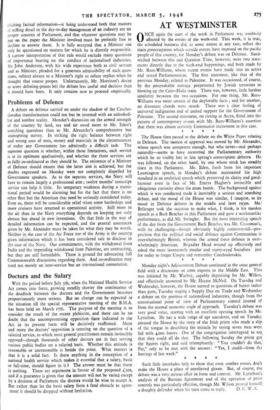AT WESTMINSTER
ONCE again the start of the week in Parliament was sombrely affected by the events of the week-end. This week, it is true, the scheduled business did, to some extent at any rate, reflect the main preoccupation which outside events have imposed on the pacific people of this country, for Monday's debate was on Defence. Sand- wiched between this and Question Time, however, were two state- ments directly due to the week-end happenings, and both made by Mr. Rees-Williams, whom recent events have made into an active and tested Parliamentarian. The first statement, like that of the previous Monday, related to Palestine. It was occasioned, of course, by the _unspeakable outrage perpetrated by Jewish terrorists in blowing up the Cairo-Haifa train. There was, however, little further similarity between the two occasions. For one thing, Mr. Rees- Williams was more certain of the deplorable facts ; and for another, no dissonant chords were struck. There was a clear feeling of universal indignation and of united support for the Government of Palestine. The second statement, on rioting at Accra, fitted into the pattern of contemporary events with Mr. Rees-Williams's assertion
that there was almost certainly Communist incitement in this case. * *
The House then passed to the debate on the White Paper relating to Defence. The motion of approval was moved by Mr. Alexander,' whose speech was competent enough, but who never—and perhaps naturally—seems to have recovered the Parliamentary authority which he so visibly lost in last spring's conscription debates. He was followed, on the other hand, by one whose stock has steadily. risen in this Parliament. Mr. Eden, fresh from his important Leamington speech, in Monday's debate maintained his high standard in an analytical speech which preserved its clarity and good-' humour even in face of Mr. Emrys Hughes's invincible and ubiquitous curiosity about the atom bomb. The background against which it was conducted made it inevitably a serious and searching debate, and the mood of the House was similar, I imagine, to its mood in Defence debates in the middle and later 193os. Mr) Bellenger took the occasion to make what, I think, is his maiden speech as a Back Bencher in this Parliament and gave a workmanlike performance, as did Mr. Swingler. But the most interesting speech of the day from the Government Back Benches was Mr. Crossman's, with its challenging—though obviously highly controversial—pro- position that the political and social defence against Communism is overwhelmingly British, whereas the armed force defence is over- whelmingly American. Brigadier Head wound up effectively and asked the more inveterately insular and starry-eyed Socialists just
for today to forget Utopia and remember Czechoslovakia. * *
Monday night's Adjournment Debate continued in the same general field with a discussion on arms exports to the Middle East. This was initiated by Mr. Warbey, capably deputising for Mr. Wilkes, and effectively answered by Mr. Hector McNeil. On Tuesday and Wednesday, however, the House turned to questions of butter rather than guns, Tuesday staging a Supply Day on Trade and Wednesday a debate on the position of nationalised industries, though from the constitutional point of view of Parliamentary control instead of from the normal economic angle of approach. Tuesday's debate was very good value, starting with an excellent opening speech by Mr.' Lyttelton. He has a wide range of apt anecdotes, and on Tuesday, amused the House by the story of the Irish priest who made a slip, of the tongue in describing the miracle by saying seven men were fed with 4,000 loaves. One of the congregation interrupted to say, that they could all do that. The following Sunday the priest got the figures right, and said triumphantly: "You couldn't do that,' Pat," only to be met with the answer: " Yes, I could—from the
leavings of last week." * * * *
Such little interludes help to show that even sombre events don't make the House a place of unrelieved gloom. But, of course, the, debate was a very serious affair in form and content. Mr. Lyttelton's analysis of the Russian Agreement and of the operation of price, controls was particularly effective, though Mr. Wilson proved himself;
a doughty defender when his turn came to reply. D. C. W.-S.






























 Previous page
Previous page